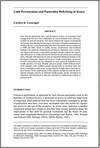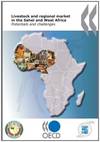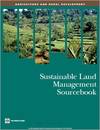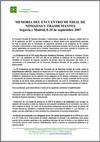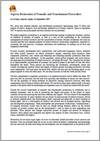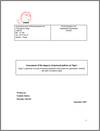Pastoralism is being considered one of the most viable form of production and land-use in the drylands, but it is also recognised that pastoralists are often restricted due to legal, economic, social and political disincentives and barriers to mobility of livestock and to communal management of rangelands. Little research has been made into whether the situation is reversible. The WISP worked in 6 different countries who reported positive environmental outcomes as a result of policy changes in favour of mobile pastoralism. Though all countries report remaining challenges to securing pastoral livelihoods and promoting sustainable land management, they also report gains have been made as a result of policy changes that have enabled pastoralist natural resource management.
Year of publication: 2008Organization: Individual authors, International Union for Conservation of Nature (IUCN), United Nations Development Programme (UNDP)
Topic: Environmental services, Organization, Participation
Language: English
Type of document: Technical, Policies and legislation
Geographical coverage: Global
This article analyses the impact on household well-being of privatizing land among a community of Samburu pastoralists in northern Kenya. Results indicate few significant differences in wealth and income between the privatized and communal areas, although cultivation has become an important additional strategy in the privatized community. Groups exhibit different livelihood strategies with wealthier groups relying more on livestock trade and home consumption while poorer groups depend on wage labour and trade for their income. Policy implications of this analysis include the need for development strategies specific to different wealth groups, greater investment in education and infrastructure, and more attention to employment creation in pastoral areas.
Year of publication: 2008Organization: Individual authors
Topic: Economy
Language: English
Type of document: Technical, Scientific, Policies and legislation
Geographical coverage: Eastern Africa
The aim of this joint ECOWAS Commission and Sahel and West Africa Club Secretariat (SWAC/OECD) initiative is to examine how livestock rearing could stimulate the West African agricultural and food products market by strengthening food and nutritional security and by contributing to poverty reduction.
Year of publication: 2008Organization: Individual authors
Topic: Climate change, Economy, Food security, Innovation, Organization, Participation, Resilience
Language: English
Type of document: Technical, Policies and legislation
Geographical coverage: West Africa
Livestock mobility allows millions of pastoralists and agropastoralists to lead productive lives in areas few other producers can exploit. It is critical for local livelihoods, for trade, and for coping with climate change. In several parts of Africa there are important efforts underway to facilitate livestock mobility and to remove the obstacles that constrain the inherent flexibility of pastoral systems. This one-year project drew together the lessons from these initiatives in order to increase understanding about the importance of livestock mobility in drylands. In so doing it has laid the foundations for a longer-term programme of work to enhance livestock mobility in East and West Africa and thus promote the sustainability of pastoral and agro-pastoral livelihoods.
Year of publication: 2008Organization: International Institute for Environment and Development (IIED), SOS Sahel
Topic: Environmental services
Language: English
Type of document: Technical
Geographical coverage: West Africa, Eastern Africa
The sourcebook provides a knowledge repository of tested practices and innovative resource management approaches. The diverse menu of options represents the current state of the art of good land management practices. Some chapters specifically address pastoralism. This book is of interest to project managers and practitioners working to enhance land and natural resource management in developing countries.
Year of publication: 2008Organization: World Bank
Topic: Land
Language: English
Type of document: Technical
Geographical coverage: Global
El Encuentro Mundial de Pastores Nómadas y Trashumantes, celebrado en Segovia y Madrid del 8 al 20 de septiembre de 2007, ha permitido establecer un diálogo abierto entre representantes pastoriles de todo el planeta para la formulación de soluciones concretas a los problemas de los pueblos nómadas y trashumantes a nivel mundial.
Year of publication: 2007Organization: Asociación Trashumancia y Naturaleza
Topic: Climate change, Environmental services, Healthcare, Organization, Value addition
Language: Español
Type of document: Technical, Policies and legislation
Geographical coverage: Global
This declaration was made at the world gathering of nomadic and transhumant pastoralists in Segovia, Spain in September 2007. Two hundred nomadic and transhumant pastoralists urged governments and international organizations to recognise the importance of pastoralism and to support pastoralist communities worldwide.
Year of publication: 2007Organization: United Nations Economic Commission for Africa (ECA)
Topic: Participation
Language: English
Type of document: Policies and legislation
Geographical coverage: Global
Niger’s experience in terms of pastoralists’ mobility and cattle circulation rights is a model and may be presented through an overview of some key relevant laws. This overview reveals that the policies boil down to a few strong principles, and Niger’s contribution to the sub-region’s recognition of the need for and usefulness of mobility (international transhumance) in the ECOWAS zone. Asserting these principles has assured pastoralists recognition of their activity, their way of life, and their specific rights across an important portion of the national territory. However, in the study area, the enforcement of texts is not beneficial to pastoralists and in a context of a strong demographic growth, recognition of their rights is made more difficult by the rush for land tenure. As a result of the loss of consideration for their way of life and the lack of recognition of their contribution to the development of pastoral areas, they are asking for the States Generals on pastoralism to be convened to allow them to contribute to the Pastoral Code in preparation.
Year of publication: 2007Organization: Individual authors, International Union for Conservation of Nature (IUCN)
Topic: Conflict, Indigenous knowledge, Innovation, Land, Organization, Participation
Language: English
Type of document: Policies and legislation
Geographical coverage: West Africa



